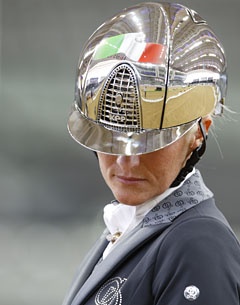
The seventh annual Riders4Helmets International Helmet Awareness Day is rapidly approaching on Saturday 17 September 2016 and the American organisation likes to draw more attention to riders who have suffered from concussion.
The average amount of traumatic brain injury-related deaths in equestrian sport is more than seven times that of traumatic brain injury-related deaths in contact sports (such as American football)? That’s an average of 60 deaths in equestrian sports each year.
Much of those deaths can be due to an inaccurate diagnosis of a concussion.
Concussion Basics
According to the Center for Disease Control, a concussion is a type of traumatic brain injury (TBI) caused by a bump, blow or jolt to the head, which causes the brain or head to move back and forth rapidly. When that happens, inside your head your brain will bounce or twist around, damaging the brain cells, thus creating chemical changes in the brain.
Concussions cannot be captured on any imaging because there are no abnormalities, says Dr. Lola Chambless, a neurosurgeon at Vanderbilt University in Nashville, Tenn., and longtime eventing rider. “The symptoms are purely a clinical diagnosis—you will not see anything on a CT scan or MRI.
Signs and symptoms of a concussion are:
Appearing dazed or confused
Headache
Nausea or vomiting
Balance problems or dizziness
Feeling groggy or sluggish
Is It a Concussion?
Because most falls can happen when you’re not at a sanctioned equestrian event, most concussions can go undiagnosed.
“Things like that happen all the time, and most people generally are not going to seek medical attention unless they are very symptomatic,” says Dr. Chambless.
Dr. Chambless has worked with the National Football League to help come up with a concussion protocol to be used along the sidelines at the games to help diagnose players with concussions. And while the protocol’s questions are football specific, they can be modified for any sport. She strongly encourages trainers, instructors and riders to all learn to ask these questions any time a fellow rider has come off their horse.
The series of questions are fairly simple to essentially test immediate and short-term memory of the person in question. Questions may include: Where are we riding today? What color is your saddle pad? Where did you last show your horse? What’s your horse’s name? If she/he cannot answer one of these questions, it is recommended to have a physician see them to make a further diagnosis.
And it’s the aftercare for concussions that are just as important. Someone who has suffered from a previous concussion should try to avoid taking any unnecessary risks with training, but most importantly prevent secondary injury. Secondary injury is when a rider returns to the saddle before they’ve fully recovered from a concussion, putting them at a much greater risk for long-term or permanent issues from a concussion.
Can a Helmet Prevent a Concussion?
While approved helmets do reduce the chance of a lethal head injury and can save your life, they do not prevent concussions.
Helmets are designed to limit the types of forces that cause skull fractures and intracranial hemorrhage, which are things that are going to kill you or leave you with neurologic problems. Unfortunately, they are not designed to affect the forces that generally we believe can cause a concussion.
“Unfortunately, there is no safety gear out there currently that really reduces your chances of concussion from a fall of 6 feet, which is basically what you're assuming you’re going to fall from in most equestrian injuries,” says Dr. Chambless. “We can’t prevent people from falling off, but we can make it a lesser risk by wearing a helmet and riding in safe situations.”
Related Links
Silvia Rizzo, Ambassador for Helmet Wearing on 2015 International Helmet Awareness Day
FEI Launches Global Safety Helmet Campaign
Riders4Helmets to Host Third Helmet Safety Symposium
Hold on to Your Safety Hat, Helmet Rule in Place 1 January 2013
Riders4Helmets Announces International Helmet Awareness Day 2012